פון דער היײַנטעקער מילכאָמע װעל איך לידער זינגען, [1]
אז סע זאָל די גאנצע װעלט מיט די לידער קלינגען,
װי ס'איז פאָרגעקומן דאָרט מיט יאָשקע דעם אָדעסער,
אז ער האָט געשלאָגן זיך מיטן דײַטש אפ מעסער.
װי ער האט דערזען פאר זיך די מערדערישע צורעס,
האָט ער באלד געשװױרן זיך: זיי קורץ מאכן די שורעס.
איי, דײַטשוקעס, װאָס איר האלט זיך פאר א וואזשנער קיילע!
פּאסעס װעט מען פון אַײַך שנײַדן, װי פון א נעוויילע.
פאר די זויג–קינדער, וואס איר האָט לעבעדיק באגראָבן
וועט איר, טרייפע היצלעס, אײַער אויסקומעניש האָבן.
ווײַל איר האָט די שיינע שטאָט וויסט געמאכט און כאָרעוו
פארן לעבן אײַערן בין איך זיך ניט אָרעוו.
דרײַ מעסלעס געהאָגלט האָט דורכאנאנד מיט פײַער ,
יאָשקע האָט ניט אויסגעלאָזט אָן א קויל זײַן שפּײַער.
ער האָט די פאשיסטן – אָכ! גענעריקט אָן א שטייגער,
אפ דער ערד געפאלן איז א פּייגער לעם א פּייגער.
יאָשקע האָט דאָך נאָר געוואָלט זײַן פאָטערלאנד באשיצן,
האָט ער אָן ראכמאָנעס זיך צערעכנט מיט די פריצן –
היטלערן א מוסער דאָ זיך אראָפּצונעמען,
יאָשקעס נאָמען וועט אפ אייביק רימען זיך און שעמען.
אז סע זאָל די גאנצע װעלט מיט די לידער קלינגען,
װי ס'איז פאָרגעקומן דאָרט מיט יאָשקע דעם אָדעסער,
אז ער האָט געשלאָגן זיך מיטן דײַטש אפ מעסער.
װי ער האט דערזען פאר זיך די מערדערישע צורעס,
האָט ער באלד געשװױרן זיך: זיי קורץ מאכן די שורעס.
איי, דײַטשוקעס, װאָס איר האלט זיך פאר א וואזשנער קיילע!
פּאסעס װעט מען פון אַײַך שנײַדן, װי פון א נעוויילע.
פאר די זויג–קינדער, וואס איר האָט לעבעדיק באגראָבן
וועט איר, טרייפע היצלעס, אײַער אויסקומעניש האָבן.
ווײַל איר האָט די שיינע שטאָט וויסט געמאכט און כאָרעוו
פארן לעבן אײַערן בין איך זיך ניט אָרעוו.
דרײַ מעסלעס געהאָגלט האָט דורכאנאנד מיט פײַער ,
יאָשקע האָט ניט אויסגעלאָזט אָן א קויל זײַן שפּײַער.
ער האָט די פאשיסטן – אָכ! גענעריקט אָן א שטייגער,
אפ דער ערד געפאלן איז א פּייגער לעם א פּייגער.
יאָשקע האָט דאָך נאָר געוואָלט זײַן פאָטערלאנד באשיצן,
האָט ער אָן ראכמאָנעס זיך צערעכנט מיט די פריצן –
היטלערן א מוסער דאָ זיך אראָפּצונעמען,
יאָשקעס נאָמען וועט אפ אייביק רימען זיך און שעמען.
[1] Trascrizione / Transcription:
Fun der haynteker milkhome vel ikh lider zingen,
Az se zol di gantse velt mit di lider klingen,
Vi s’iz forgekumn dort mit Yoshke dem odeser,
Az er hot geshlogn zikh mitn daytsh af meser.
Vi er hot derzen far zikh di merderishe tsures,
Hot er bald geshvoyrn zikh: zey kurts makhn di shures.
Ay, daytshukes, vos ir halt zikh far a vazhner keyle!
Pases vet men fun aykh shnaydn, vi fun a neveyle.
Far di zoyg-kinder, vos ir hot lebedik bagrobn
Vet ir, treyfe hitsles, ayer oyskumenish hobn.
Vayl ir hot di sheyne shtot vist gemakht un khorev
Farn lebn ayern bin ikh zikh nit orev.
Dray mesles gehoglt hot durkhanand mit fayer,
Yoshke hot nit oysgelozt on a koyl zayn shpayer.
Er hot di fashistn – okh! generikt on a shteyger,
Af der erd gefaln iz a peyger lem a peyger.
Yoshke hot dokh nor gevolt zayn foterland bashitsn,
Hot er on rakhmones zikh tserekhnt mit di fritsn –
Hitlern a muser do zikh aroptsunemen,
Yoshkes nomen vet af eybik rimen zikh un shemen.
Az se zol di gantse velt mit di lider klingen,
Vi s’iz forgekumn dort mit Yoshke dem odeser,
Az er hot geshlogn zikh mitn daytsh af meser.
Vi er hot derzen far zikh di merderishe tsures,
Hot er bald geshvoyrn zikh: zey kurts makhn di shures.
Ay, daytshukes, vos ir halt zikh far a vazhner keyle!
Pases vet men fun aykh shnaydn, vi fun a neveyle.
Far di zoyg-kinder, vos ir hot lebedik bagrobn
Vet ir, treyfe hitsles, ayer oyskumenish hobn.
Vayl ir hot di sheyne shtot vist gemakht un khorev
Farn lebn ayern bin ikh zikh nit orev.
Dray mesles gehoglt hot durkhanand mit fayer,
Yoshke hot nit oysgelozt on a koyl zayn shpayer.
Er hot di fashistn – okh! generikt on a shteyger,
Af der erd gefaln iz a peyger lem a peyger.
Yoshke hot dokh nor gevolt zayn foterland bashitsn,
Hot er on rakhmones zikh tserekhnt mit di fritsn –
Hitlern a muser do zikh aroptsunemen,
Yoshkes nomen vet af eybik rimen zikh un shemen.
Contributed by Dq82 - 2022/6/6 - 13:56
Language: Italian
Traduzione italiana / Italian translation / Traduction italienne / Italiankielinen käännös:
Riccardo Venturi, 9-6-2022 16:30
Poiché la traduzione inglese è in alcuni punti un po' libera e “interpretativa”, mi sono permesso di farne una italiana corredata di note. Come si potrà notare, molte note riportano “propriamente, la grafia ebraica”; questo perché il testo yiddish, così come riportato, non usa la grafia standard dello yiddish. Nel testo, tutte le parole di origine ebraica (che, normalmente, si scrivono nella grafia originale e che, quindi, devono essere imparate una ad una da chi non conosce l'ebraico, con la relativa pronuncia ashkenazita in yiddish che, in pratica, non corrisponde mai a quella dell'ebraico moderno pronunciato alla sefardita), sono scritte in grafia fonetica normale, come le parole di origine tedesca, latina o russa. Si tratta di una pratica che ha lungamente diviso i parlanti dello yiddish; la grafia fonetica venne peraltro resa obbligatoria nell'Unione Sovietica poco dopo la Rivoluzione. Questo sia per facilitare la lettura (nel medesimo periodo, veniva peraltro riformata anche la stessa ortografia del russo), sia per slegare lo yiddish dalle sue radici religiose e farne la lingua pienamente laica degli ebrei. I (pochi) libri in yiddish stampati nell'Unione Sovietica vennero tutti uniformati alla grafia fonetica, compresi i classici di Sholem Aleichem, Mendele Moicher-Sforim e altri. Tuttora, alcuni continuano a scrivere così lo yiddish. Poiché, in questo testo, la pratica ha tutta l'aria di essere originale (proveniendo dal tempo di guerra dell'Unione Sovietica e raccontando di Yoshke l'ammazzafascisti...), non sono minimamente intervenuto sul testo in caratteri ebraici. Nelle note, però, ho riportato regolarmente la grafia ebraica, per completezza. [RV]
Riccardo Venturi, 9-6-2022 16:30
Poiché la traduzione inglese è in alcuni punti un po' libera e “interpretativa”, mi sono permesso di farne una italiana corredata di note. Come si potrà notare, molte note riportano “propriamente, la grafia ebraica”; questo perché il testo yiddish, così come riportato, non usa la grafia standard dello yiddish. Nel testo, tutte le parole di origine ebraica (che, normalmente, si scrivono nella grafia originale e che, quindi, devono essere imparate una ad una da chi non conosce l'ebraico, con la relativa pronuncia ashkenazita in yiddish che, in pratica, non corrisponde mai a quella dell'ebraico moderno pronunciato alla sefardita), sono scritte in grafia fonetica normale, come le parole di origine tedesca, latina o russa. Si tratta di una pratica che ha lungamente diviso i parlanti dello yiddish; la grafia fonetica venne peraltro resa obbligatoria nell'Unione Sovietica poco dopo la Rivoluzione. Questo sia per facilitare la lettura (nel medesimo periodo, veniva peraltro riformata anche la stessa ortografia del russo), sia per slegare lo yiddish dalle sue radici religiose e farne la lingua pienamente laica degli ebrei. I (pochi) libri in yiddish stampati nell'Unione Sovietica vennero tutti uniformati alla grafia fonetica, compresi i classici di Sholem Aleichem, Mendele Moicher-Sforim e altri. Tuttora, alcuni continuano a scrivere così lo yiddish. Poiché, in questo testo, la pratica ha tutta l'aria di essere originale (proveniendo dal tempo di guerra dell'Unione Sovietica e raccontando di Yoshke l'ammazzafascisti...), non sono minimamente intervenuto sul testo in caratteri ebraici. Nelle note, però, ho riportato regolarmente la grafia ebraica, per completezza. [RV]
”Yoshke di Odessa” fu scritta da una donna di nome Berta Flaksman. E' una delle poche canzoni dell'album che fu realmente pubblicata durante la guerra, raccolta da tale Shalom Cooper Schmidt, sfollato a Mosca da Kiev, non si sa esattamente da dove. Si trovava sul treno che stava portando via lui ed altri sfollati dalla zona di guerra. Sul treno, andava raccogliendo canzoni cantate dai passeggeri; alcuni di essi avevano visto da poco atrocità nei confronti degli Ebrei, ed erano scappati. Si tratta così della prima testimonianza oculare della violenza che gli Ebrei cominciavano a subire durante la guerra.
In particolare, questa canzone racconta la storia di tale Yoshke di Odessa, un nome ebraico molto comune, che va in guerra a combattere contro i tedeschi. Le parole della canzone sono violentissime; ad esempio, dice: “Tedescacci, vi ritenete bravi macellai, ma vi taglieremo a fette come la carogna di un animalaccio e ci faremo delle cinture.” E' importante quando dice qualcosa come “vi ammazzeremo come maiali”, perché nella tradizione ebraica è importantissimo come si macella l'animale che poi si mangerà. Si chiama Shechita, la macellazione rituale.
Quando si ammazzano mucche o polli per il consumo umano, i macellai devono seguire tutte le leggi compreso l'abbattimento pietoso, nel modo in cui lo si intendeva migliaia di anni fa. Gli animali devono essere abbattuti in un colpo solo e roba del genere. Gli animali non commestibili, come i maiali, che non sono kosher e non possono essere mangiati dagli Ebrei, possono essere utilizzti per fare cinture, o capi di abbigliamento, ecc. Per il loro abbattimento non si devono seguire le leggi rituali, e si hanno regole del tutto differenti.
I macellai che abbattono gli animali kosher devono essere umani e pietosi. Quelli che, invece, ammazzano i maiali sono veri “macellai” e non si curano di queste cose. Per questo motivo è importante quando la canzone dice “Vi ammazzeremo come maiali” ecc. La strofa dopo dice: “Poiché avete ammazzato i nostri neonati, avete distrutto le nostre città, stuprato le nostre donne, questa è la nostra vendetta” [La canzone in realtà non menziona stupri e vendette, ndt]. Colpisce molto il livello di cruda violenza e di rabbia di questa canzone; non ci siamo abituati. [trad. ad. RV]
In particolare, questa canzone racconta la storia di tale Yoshke di Odessa, un nome ebraico molto comune, che va in guerra a combattere contro i tedeschi. Le parole della canzone sono violentissime; ad esempio, dice: “Tedescacci, vi ritenete bravi macellai, ma vi taglieremo a fette come la carogna di un animalaccio e ci faremo delle cinture.” E' importante quando dice qualcosa come “vi ammazzeremo come maiali”, perché nella tradizione ebraica è importantissimo come si macella l'animale che poi si mangerà. Si chiama Shechita, la macellazione rituale.
Quando si ammazzano mucche o polli per il consumo umano, i macellai devono seguire tutte le leggi compreso l'abbattimento pietoso, nel modo in cui lo si intendeva migliaia di anni fa. Gli animali devono essere abbattuti in un colpo solo e roba del genere. Gli animali non commestibili, come i maiali, che non sono kosher e non possono essere mangiati dagli Ebrei, possono essere utilizzti per fare cinture, o capi di abbigliamento, ecc. Per il loro abbattimento non si devono seguire le leggi rituali, e si hanno regole del tutto differenti.
I macellai che abbattono gli animali kosher devono essere umani e pietosi. Quelli che, invece, ammazzano i maiali sono veri “macellai” e non si curano di queste cose. Per questo motivo è importante quando la canzone dice “Vi ammazzeremo come maiali” ecc. La strofa dopo dice: “Poiché avete ammazzato i nostri neonati, avete distrutto le nostre città, stuprato le nostre donne, questa è la nostra vendetta” [La canzone in realtà non menziona stupri e vendette, ndt]. Colpisce molto il livello di cruda violenza e di rabbia di questa canzone; non ci siamo abituati. [trad. ad. RV]
Yoshke di Odessa
Canterò canzoni sulla guerra attuale,
Così che il mondo intero risuoni di canzoni,
Di com'è successo là con Yoshke di Odessa,
Di come si è battuto, coltello alla mano, col tedesco. [1]
Quando si è accorto d'aver davanti quella faccia [2] d'assassino
Ha sùbito giurato a se stesso: le loro fila si assottiglieranno. [3]
Ehi, tedescàcci [4], vi ritenete bravi macellai ! [5]
Vi taglieremo a fette, [6] come la carogna di un animalaccio. [7]
Per i lattanti, che avete seppelliti vivi,
Riceverete, sporchi farabutti [8], ciò che vi spetta, [9]
Poiché avete distrutto e devastato questa bella città, [10]
Non posso garantirvi [11] la vita.
Per tre giorni notte e dì li ha tempestati di fuoco,
Yoshke non ha lasciato il suo revolver senza un colpo non sparato.
Ach! Abbatteva i fascisti con nonchalance, senza rispetto,
Per terra cadevano cadaveri [12] su cadaveri.
Yoshke, però, voleva soltanto proteggere la sua patria,
Senza pietà ha regolato i suoi conti con i crucchi. [13]
A Hitler [14] ha impartito una bella lezioncina, [15]
Il nome di Yoskhe sarà per sempre lodato e apporterà vergogna. [16]
Canterò canzoni sulla guerra attuale,
Così che il mondo intero risuoni di canzoni,
Di com'è successo là con Yoshke di Odessa,
Di come si è battuto, coltello alla mano, col tedesco. [1]
Quando si è accorto d'aver davanti quella faccia [2] d'assassino
Ha sùbito giurato a se stesso: le loro fila si assottiglieranno. [3]
Ehi, tedescàcci [4], vi ritenete bravi macellai ! [5]
Vi taglieremo a fette, [6] come la carogna di un animalaccio. [7]
Per i lattanti, che avete seppelliti vivi,
Riceverete, sporchi farabutti [8], ciò che vi spetta, [9]
Poiché avete distrutto e devastato questa bella città, [10]
Non posso garantirvi [11] la vita.
Per tre giorni notte e dì li ha tempestati di fuoco,
Yoshke non ha lasciato il suo revolver senza un colpo non sparato.
Ach! Abbatteva i fascisti con nonchalance, senza rispetto,
Per terra cadevano cadaveri [12] su cadaveri.
Yoshke, però, voleva soltanto proteggere la sua patria,
Senza pietà ha regolato i suoi conti con i crucchi. [13]
A Hitler [14] ha impartito una bella lezioncina, [15]
Il nome di Yoskhe sarà per sempre lodato e apporterà vergogna. [16]
[1] In tutto il testo della canzone, vi è un uso del tutto libero del plurale e del singolare collettivo (ad es., qui, “il tedesco” vale per “i tedeschi”). E' un uso non ignoto all'italiano (tipo: “va fuori d'Italia, va fuori, o stranier!”). Nella traduzione, ho mantenuto a volte l'uso alla lettera, quando in italiano non suonava male.
[2] tsures “facce, visi; aspetti”, propriamente, in grafia ebraica, צורות.
[3] shures “fila, linee”, propriamente, in grafia ebraica, שורות.
[4] Il termine ha valore sia spregiativo, sia diminutivo. Ho tradotto “tedescacci”, ma potrebbe essere reso anche con “tedescucci” (si ricordi il famoso “ucci ucci, sento odor di cristianucci” della favola Il re porco).
[5] Il termine, nella forma usuale, suona kayler (קײַלער); si tratta di un derivato dal verbo koylen (ted. keulen “macellare”, in origine “macellare animali per evitare epidemie”). La nota apposta alla traduzione inglese è esatta: il termine indica il “macellaio non kosher” (il macellaio rituale kosher si chiama, con termine ovviamente ebraico, katsev [קצבֿ]) ed è quindi altamente spregiativo. Anche qui si usa un singolare collettivo, che questa volta però non ho mantenuto in italiano.
[6] Il termine pases significa, più propriamente, “strisce, striscioline”; ed anche “cinghie, cinture”. Pas significa anche “metro a nastro” (quello dei sarti), e normalmente il plurale è pasn (che esistesse anche la forma pases mi era ignoto fino ad oggi; una riprova che lo yiddish “standard” non esiste e non è mai esistito). Qui, comunque, ho preferito tradurre con “tagliare a fette” sia per utilizzare un'espressione italiana comune, sia perché “fetta” è spesso usato nella terminologia sartoriale per “striscia”.
[7] Neveyle, in grafia ebraica propriamente נבֿלה , significa di per sé “carogna, carcassa”, ovviamente di un qualche “animale impuro” -in primis il maiale. Quanto il termine sia spregiativo, lo si vede anche dal fatto che, normalmente, è anche un epiteto sanguinoso rivolto a una donna (“troia”, “maiala”, “porca” ecc.)
[8] Il termine treyf, o treyfe è di origine ebraica, e significa, propriamente, “impuro, non kosher” (si noterà quanto, in questa canzone, i termini legati alla kasherut siano usati di continuo, per sottolineare la ributtante impurità dei tedeschi). Curiosamente, però, anche nello yiddish standard si preferisce la grafia fonetica, טרײפֿע, a quella ebraica (טריפֿה). Esistono altri (pochi) casi del genere. Sul termine hitsel (pl. hitsles) “farabutto, mariolo” ecc., da dire che veniva spesso utilizzato per storpiare il nome di Hitler: Adolf Hitsel, o Hitsler.
[9] Lett. oyskumenish hobn significa il “patrimonio spettante”, gli “averi ereditati”.
[10] khorev (qui nell'espr. khorev makhn) significa sia “distrutto, devastato”, che “malato a morte, moribondo”. In grafia ebraica è, propriamente, חרובֿ.
[11] orev “responsabile, garante, mallevadore”; in grafia ebraica, propriamente, ערבֿ.
[12] peyger indica specificamente il “cadavere di un animale” e, quindi, la “carogna”. In grafia ebraica è, propriamente, פּגר.
[13] Qui viene usato un comune termine spregiativo per i tedeschi, “Fritz”, diffuso in mezza Europa.
[14] Da notare che, essendo un nome proprio, a Hitler viene applicato correttamente il relitto di declinazione rimasto in yiddish (nomi propri e un paio di nomi comuni). Qui ci abbiamo un Führer al dativo.
[15] Traduco così per rendere il termine muser (in grafia ebraica, propriamente: מוסר ). Ma il termine ha una storia che merita di essere esposta per sommi capi. In yiddish significa “lezione di morale”, “rampogna moralistica” e deriva il suo nome dal Movimento Mussar, un movimento etico, educativo e culturale ebraico fondato nel XIX secolo dal rabbino e talmudista Israel Salanter. Era diffuso soprattutto tra gli ebrei ortodossi lituani.
[16] “farà vergognare”, nel senso che apporterà vergogna ai tedeschi.
[2] tsures “facce, visi; aspetti”, propriamente, in grafia ebraica, צורות.
[3] shures “fila, linee”, propriamente, in grafia ebraica, שורות.
[4] Il termine ha valore sia spregiativo, sia diminutivo. Ho tradotto “tedescacci”, ma potrebbe essere reso anche con “tedescucci” (si ricordi il famoso “ucci ucci, sento odor di cristianucci” della favola Il re porco).
[5] Il termine, nella forma usuale, suona kayler (קײַלער); si tratta di un derivato dal verbo koylen (ted. keulen “macellare”, in origine “macellare animali per evitare epidemie”). La nota apposta alla traduzione inglese è esatta: il termine indica il “macellaio non kosher” (il macellaio rituale kosher si chiama, con termine ovviamente ebraico, katsev [קצבֿ]) ed è quindi altamente spregiativo. Anche qui si usa un singolare collettivo, che questa volta però non ho mantenuto in italiano.
[6] Il termine pases significa, più propriamente, “strisce, striscioline”; ed anche “cinghie, cinture”. Pas significa anche “metro a nastro” (quello dei sarti), e normalmente il plurale è pasn (che esistesse anche la forma pases mi era ignoto fino ad oggi; una riprova che lo yiddish “standard” non esiste e non è mai esistito). Qui, comunque, ho preferito tradurre con “tagliare a fette” sia per utilizzare un'espressione italiana comune, sia perché “fetta” è spesso usato nella terminologia sartoriale per “striscia”.
[7] Neveyle, in grafia ebraica propriamente נבֿלה , significa di per sé “carogna, carcassa”, ovviamente di un qualche “animale impuro” -in primis il maiale. Quanto il termine sia spregiativo, lo si vede anche dal fatto che, normalmente, è anche un epiteto sanguinoso rivolto a una donna (“troia”, “maiala”, “porca” ecc.)
[8] Il termine treyf, o treyfe è di origine ebraica, e significa, propriamente, “impuro, non kosher” (si noterà quanto, in questa canzone, i termini legati alla kasherut siano usati di continuo, per sottolineare la ributtante impurità dei tedeschi). Curiosamente, però, anche nello yiddish standard si preferisce la grafia fonetica, טרײפֿע, a quella ebraica (טריפֿה). Esistono altri (pochi) casi del genere. Sul termine hitsel (pl. hitsles) “farabutto, mariolo” ecc., da dire che veniva spesso utilizzato per storpiare il nome di Hitler: Adolf Hitsel, o Hitsler.
[9] Lett. oyskumenish hobn significa il “patrimonio spettante”, gli “averi ereditati”.
[10] khorev (qui nell'espr. khorev makhn) significa sia “distrutto, devastato”, che “malato a morte, moribondo”. In grafia ebraica è, propriamente, חרובֿ.
[11] orev “responsabile, garante, mallevadore”; in grafia ebraica, propriamente, ערבֿ.
[12] peyger indica specificamente il “cadavere di un animale” e, quindi, la “carogna”. In grafia ebraica è, propriamente, פּגר.
[13] Qui viene usato un comune termine spregiativo per i tedeschi, “Fritz”, diffuso in mezza Europa.
[14] Da notare che, essendo un nome proprio, a Hitler viene applicato correttamente il relitto di declinazione rimasto in yiddish (nomi propri e un paio di nomi comuni). Qui ci abbiamo un Führer al dativo.
[15] Traduco così per rendere il termine muser (in grafia ebraica, propriamente: מוסר ). Ma il termine ha una storia che merita di essere esposta per sommi capi. In yiddish significa “lezione di morale”, “rampogna moralistica” e deriva il suo nome dal Movimento Mussar, un movimento etico, educativo e culturale ebraico fondato nel XIX secolo dal rabbino e talmudista Israel Salanter. Era diffuso soprattutto tra gli ebrei ortodossi lituani.
[16] “farà vergognare”, nel senso che apporterà vergogna ai tedeschi.
Language: English
English translation / Traduzione inglese / Traduction anglaise / Englanninkielinen käännös:
--> Yiddish Glory Official Website
--> Yiddish Glory Official Website
YOSHKE FROM ODESSA
I’ll sing songs about today’s battle
So the whole world will resound with [the] music
How it played out there with Yushke from Odessa
How he sparred with the Germans, knife [in hand]
When he saw for himself the murderous sorrow
He quickly swore: [he would] shorten their lines.
Oh, you German, you fancy yourselves such impressive butchers! [1]
We’ll slice strips from you, as [we would] from a non-kosher animal
For the nursing child, whom you’ve buried alive
You will, dirty scoundrels, receive your final punishment.
Because you’ve desolated and destroyed our beautiful city,
I will not guarantee your lives.
For three full days he hailed them down, firing one after the other
Yushke didn’t stop firing bullets from his rifle
He bashed those fascists without a care -- not a bit of respect!
The mutilated bodies fell near the half-dead covering the earth
Yushke only wanted to save his Fatherland
Showing no mercy, he sorted things out with the fascists
Gave Hitler a strong lesson to remember him by
Yushke’s name will be praised and forever bring [his enemies] shame.
I’ll sing songs about today’s battle
So the whole world will resound with [the] music
How it played out there with Yushke from Odessa
How he sparred with the Germans, knife [in hand]
When he saw for himself the murderous sorrow
He quickly swore: [he would] shorten their lines.
Oh, you German, you fancy yourselves such impressive butchers! [1]
We’ll slice strips from you, as [we would] from a non-kosher animal
For the nursing child, whom you’ve buried alive
You will, dirty scoundrels, receive your final punishment.
Because you’ve desolated and destroyed our beautiful city,
I will not guarantee your lives.
For three full days he hailed them down, firing one after the other
Yushke didn’t stop firing bullets from his rifle
He bashed those fascists without a care -- not a bit of respect!
The mutilated bodies fell near the half-dead covering the earth
Yushke only wanted to save his Fatherland
Showing no mercy, he sorted things out with the fascists
Gave Hitler a strong lesson to remember him by
Yushke’s name will be praised and forever bring [his enemies] shame.
[1] The Yiddish word translates to “non-kosher butcher”
Contributed by Dq82 - 2022/6/6 - 14:01
×
![]()
Note for non-Italian users: Sorry, though the interface of this website is translated into English, most commentaries and biographies are in Italian and/or in other languages like French, German, Spanish, Russian etc.

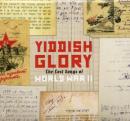
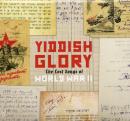
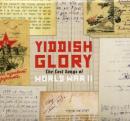
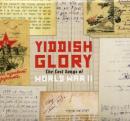
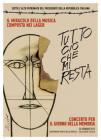

[194?...]
Album / Albumi: Yiddish Glory – The Lost Songs Of World War II [2018]
Babi Yar (Golda Rovinskaja)
Af hoykhn barg (Veli Šargorodskij)
Yoshke fun Odes (Berta Flaksman)
Mayn pulemyot (Anonimo / Anonymous)
Taybls briv (Taybl Birman)
Misha tserayst Hitlers Daytshland (Taybl Birman)
Another song in that vein features “Yoshke fun Odes” (Yoshke from Odessa), a raging Jewish butcher who is fully the match of the German butchers who “desolated and destroyed our beautiful city.” In Berta Flaksman’s lyric:
firing one after the other.
Yoshke didn’t stop firing bullets from his rifle,
He bashed those fascists without a care—not a bit of respect!
The mutilated bodies fell near the half-dead covering the earth.
Any question why Yoshke sought just and righteous retribution? Why he might have revered Comrade Stalin?
So that particular song tells a story of a man named Yoshke, a popular Jewish name, from Odessa, who goes to the war and goes and fights against the German army. And the words of that song are extremely violent. For example, it says, "Germans, you think you're such good soldiers, but we will kill you like we kill pigs and we'll slice you into pieces and then make belts from you." So it's important that it says, "We'll kill you like pigs." Because in Jewish tradition, it's very important how you kill the animal that you're going to eat, it's called the laws of Shechita, the ritual slaughter.
So when cows or chickens are being killed for consumption, then the butchers who do that they have to follow all sets of laws that include merciful killing, the way it was understood thousands of years ago. So the animals have to be slaughtered in one blow and then there's all this stuff. When animals that are not designed to be eaten such as pigs, that are not kosher and cannot by eaten by Jews are killed, but their skin could be used for belts and for clothes and stuff like this. None of these laws have to be followed, so the rules are completely different.
So butchers who kill animals are supposed to be more humane and merciful. Butchers that kill pigs, they're like real butchers, they don't care about any of that. That's why it's important that the song says, "We will kill you like we kill pigs. We will not care about any of that." And then the next verse says, "Because you killed our nursing infants, you destroyed our cities, you raped our women, and this is our revenge." The level of violence, the level of graphic violence, the level of anger in this music is striking. We're not used to that.